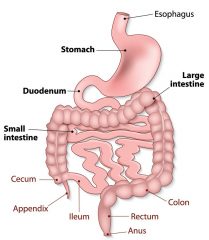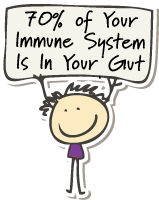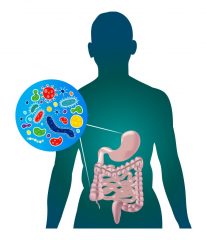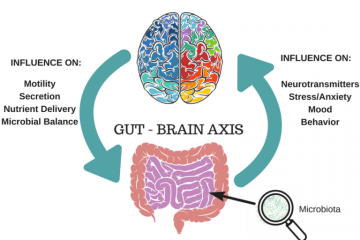“All Disease begins in the Gut” (Hippocrates, founder of modern medicine)
What is it about the gut that makes it so crucial to our health?
The understanding that most of us have about the gut is that it’s a place where food is digested and if it is not working well, we experience some discomfort and or some embarrassing moments.
The Gut, however, does more than just digest food. Research in this area has exploded since the discovery of the Gut microbiome over a decade ago (more on the gut microbiome in point 3)
 The topic of Gut health is a lengthy one and this blog is going to give you an introduction to some of the key characteristics of the gut. In subsequent blogs we will dive deeper into each aspect so that we can fully understand the role of the gut and how to best support it.
The topic of Gut health is a lengthy one and this blog is going to give you an introduction to some of the key characteristics of the gut. In subsequent blogs we will dive deeper into each aspect so that we can fully understand the role of the gut and how to best support it.
Our GI tract or the gut is a long tube that starts from the mouth, continues as esophagus, turns into the stomach and then continues first as small intestines and then as large intestines until it reaches the anus. Everything we ingest into our bodies has to first pass through our gut before it can enter our body. Our gut is essentially a gatekeeper.
Here are 5 things we need to understand about the function of our gut in order to get a deeper understanding of the role it plays in our overall health.
- Because the gut is one long tube, everything is connected. What happens in the mouth impacts what happens in the intestines. The amount of acid that is produced is impacted by how well we chew our food. The amount of enzymes that are released in the intestines is affected by how much acid is produced in the stomach. To make matters even more complicated, the movement of our gut and the release of enzymes and acids is connected to our brain. So our state of mind affects the state of the gut. (More on this in point 4)
 The gut does more than digest food! Because our gut is exposed to the outside world, it comes in contact with all sorts of things that are harmful for the body such as pathogens & chemicals. It’s job is to ensure that these dangerous elements are destroyed and do not enter our body. Hence 70% of our immune system (the system designed to protect us) is located in the gut. Having a healthy gut is crucial for a healthy immune system.
The gut does more than digest food! Because our gut is exposed to the outside world, it comes in contact with all sorts of things that are harmful for the body such as pathogens & chemicals. It’s job is to ensure that these dangerous elements are destroyed and do not enter our body. Hence 70% of our immune system (the system designed to protect us) is located in the gut. Having a healthy gut is crucial for a healthy immune system. The gut is also the host for the human microbiome. This is a community of bacteria, viruses and fungi that live inside of us. There are trillions of these organisms that live inside our gut mostly in the large intestines but also in our mouth and some in the small intestines. They are our friends! They help us digest our food, make vitamins, support the lining of the gut, modulate our immune system and so much more. In fact we are more bacteria than humans as the ratio of bugs to human cells is 10:1. The types of microorganisms as well as the diversity of these organisms has an impact on our health. The term “dysbiosis” is often referred to a condition where there is an imbalance in this eco system of microorganisms living within us. This dysbiosis has been implicated in many disease states. Hence a balanced “gut microbiome” is very important for our overall health.(https://www.frontiersin.org/articles/10.3389/fendo.2021.667066/full)
The gut is also the host for the human microbiome. This is a community of bacteria, viruses and fungi that live inside of us. There are trillions of these organisms that live inside our gut mostly in the large intestines but also in our mouth and some in the small intestines. They are our friends! They help us digest our food, make vitamins, support the lining of the gut, modulate our immune system and so much more. In fact we are more bacteria than humans as the ratio of bugs to human cells is 10:1. The types of microorganisms as well as the diversity of these organisms has an impact on our health. The term “dysbiosis” is often referred to a condition where there is an imbalance in this eco system of microorganisms living within us. This dysbiosis has been implicated in many disease states. Hence a balanced “gut microbiome” is very important for our overall health.(https://www.frontiersin.org/articles/10.3389/fendo.2021.667066/full) The gut is known as our “second brain”. The “gut-brain connection” is a bi-directional communication system between the brain & the gut. Not only does the brain tell the gut what to do but the gut also tells the brain how to think. Research is now clear that a holistic approach to addressing mental health and anxiety must include the health of our gut ( https://www.ncbi.nlm.nih.gov/pmc/articles/PMC5641835/ )
The gut is known as our “second brain”. The “gut-brain connection” is a bi-directional communication system between the brain & the gut. Not only does the brain tell the gut what to do but the gut also tells the brain how to think. Research is now clear that a holistic approach to addressing mental health and anxiety must include the health of our gut ( https://www.ncbi.nlm.nih.gov/pmc/articles/PMC5641835/ )- The lining of the gut is 1 cell thick! that’s right…only 1 layer of cells, that are tightly attached to each other like bricks in a building, separates the outside of our body from the inside. Inflammation in the gut can damage this lining and this inflammation can spread to other areas of the body. Intestinal permeability is now being widely studied as a source of inflammation in other areas of our body. Managing gut inflammation can play a role in addressing inflammation in other areas of our body. (https://www.ncbi.nlm.nih.gov/pmc/articles/PMC6889978/)
You see, our digestive tracts do so much more than digest food and the interconnection between the gut and the rest of the body makes it even more important that we pay attention to the health of our Gut.


